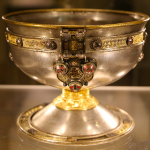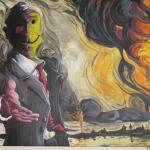I watched with curiosity the big protest against Trump in London this week.
As regular readers will know, I’m not a big fan of Mr Trump, however what we saw in London really had very little to do with Donald Trump.
Something else was going on which was much more interesting that Trump, a blimp and a crowd of angry people.
What was interesting was the anger. I watched a few interviews with protesters and there seemed to be a constant theme of rage simmering below the surface. The interviewer asked, “What specifically do you dislike about Trump and his policies?”
The replies were most often incoherent, sentimental, ignorant, inaccurate or all of the above.
The most cogent reply was from a young woman who said with a big smile, “I don’t know. I’m just angry.”
This is where it gets very interesting. Why the anger? Britain, like the USA, is one of the most privileged, affluent and aspirational countries on earth. As in the USA, if you want to get ahead and find happiness and you are not hindered by circumstances beyond your control, you can improve your life. Why the anger?
Of course there are real problems in society that can hold people back, but in our liberal democracies we have policies in place to try to correct all those things and assist those who are hindered by them.
So why the anger, and furthermore, what is really interesting was to see the crowd reaction. Not to make the Donald a victim, but what was going on with the bashing of effigies, the de-humanizing blimp, the placards full of expletives and crude language was a kind of corporate, primitive scapegoating. The anger and unhappiness is there seething and simmering within, and those who feel it come together and find someone to blame.
The find someone to blame and they kill that person. Of course if they can’t kill that person in fact, they do so with an effigy–some sort of sacrificial substitute.
So what we saw on the streets of London was an astounding example of primitive group scapegoating.
This time it was Donald Trump, but it could have been almost anyone who represents an authority figure.
Girard talks about the traits of the sacrificial scapegoat in primitive societies. It is sometimes a cripple or an outsider, a foreigner or someone perceived as a pervert. However, it can also be the priest, the prophet or the king.
In these cases the scapegoat is the authority figure. In the French and Russian Revolutions it was Kill the King.
So this was not about Donald Trump the man nor about his policies. You can debate him and his policies factually all you want, but this was not about that.
It was about incoherent, corporate rage bubbling up from a deep level.
So what is the root of this rage?
I believe there are other, deeper factors at play. In my book Praying the Rosary for Inner Healing I explore the roots of our emotions and suggest that our adult emotions are rooted in the earliest experiences of our lives. Here’s an example: I was once asked to help a fifteen year old boy who had suddenly become irrationally angry and rebellious. He had been a sweet looking kid, sang in the church choir and had been delightful. At fifteen he became a “Goth”. Black hair, black leathers, eye make up…the works. He also started stealing cars. We asked him why he did so. He didn’t know. We asked if he knew that he would go to jail. He did, but didn’t care. He was in a tailspin, and there was no rational explanation. He said he was mad at his Mom and Dad and found external reasons, but they were all groundless.
In an attempt to discover the roots of his rage we asked him mother about his early years. She said he was adopted, and that he was conceived in the back seat of a car when his mother was fifteen. She carried him for nine months in an attitude of rage, frustration, rebellion and hatred. The other priest I was working with realized that in some strange way the boy was acting out not just his own rage, but the rage and rebellion of his mother. He was working through and acting out (according to the priest’s theory) the disturbing circumstances that lay at the very foundation of his personality Read More.
















